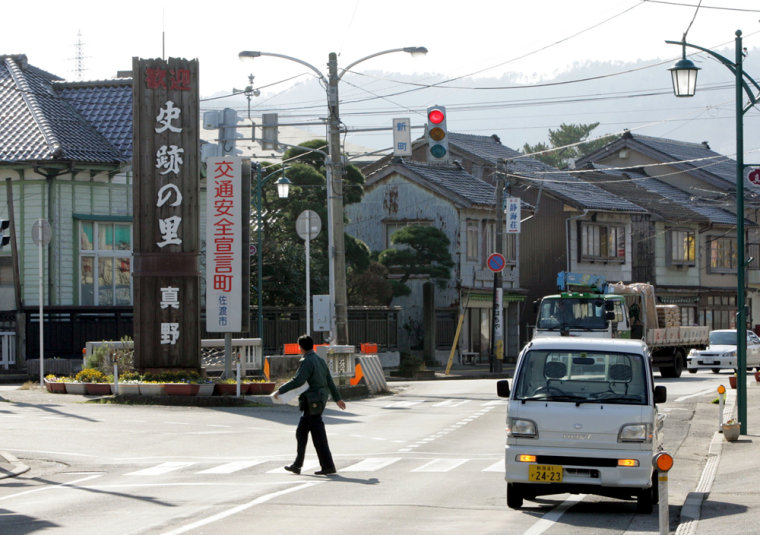U.S. Army deserter Charles Jenkins’ new home sits nestled on a quiet lane of single-story wooden houses next to a farm. A small patch of tomatoes and red peppers lines the edge of the property.
After 39 years of surveillance in totalitarian North Korea and a month in a U.S. military prison, the only people watching Jenkins on this wind-swept isle of mountainous forests and rice paddies will be his Japanese wife and their two daughters.
Plus a neighbor or two.
“He’s very welcome!” said Seiji Chitomo, 77, a cabinet salesman who lives across the street from Jenkins’ father-in-law. “We’re glad to have him.”
Jenkins’ arrival on Sado, expected next week, will end a Cold War saga that has generated an outpouring of sympathy in his wife’s homeland and offered a rare glimpse of life in North Korea.
Family reunited in Japan
Freed a week ago after serving 25 days for deserting the Army and defecting to North Korea in 1965, Jenkins, 64, said he was ready to resettle his family in Japan. That will fulfill a long-held wish of his wife, Hitomi Soga.
In 1978, when Soga was 19, she was abducted by communist agents, bundled into a black bag and loaded onto a boat bound for North Korea. The North allowed her to come home two years ago, but Jenkins and their daughters, Mika, now 21, and Brinda, now 19, stayed in North Korea.
Jenkins and his daughters came to Japan in July, and he surrendered to U.S. military authorities.
To welcome the family to the island of 70,000 people, City Hall has prepared signs in Korean and Japanese and arranged for bouquets of flowers.
“She was so lonely. It’s great the four of them can at last live together,” said Machiko Goto, 62, a neighbor. “I hope they get used to life here.”
It will be a different life, for sure.
Jenkins told a court-martial this year that he and three other U.S. soldiers lived under constant watch in the North for at least seven years. They had to scrounge for food and study the works of communist leader Kim Il Sung for up to 16 hours a day. Sometimes they were beaten.
“I longed to leave that place every day,” Jenkins said.
Sado will be a world apart — not only from North Korea, but also from much of Japan.
Separated from the main Japanese island of Honshu by rough seas, Sado is so remote that it once served as a place of exile for politicians and a penal colony. The Kamakura shogun banished Emperor Juntoku here in 1221 for inciting a revolt.
Today, the island offers tourists hot springs and provides traditional craftsmen and musicians a haven far from the hectic pace of the big city.
“We have clean air and lots of nature,” said Kimiko Doke, 52, a supermarket clerk. “Jenkins will be fine.”
Wife kidnapped by North Korea
The island’s isolation, however, may have made Sado a favored target of North Korean agents who came to Japan in the 1970s and 1980s to kidnap people to serve as language teachers for their spy program. Agents also wanted Japanese so they could assume their identities.
Chitomo, the cabinet salesman, led a search party for Soga after she vanished from Sado with her mother on Aug. 12, 1978. Villagers scoured the town for traces of the women, looking in the river and the sea. They checked passenger lists of ferries bound for the Japanese mainland.
Soga was found only in 2002, when North Korean leader Kim Jong Il admitted that his country had kidnapped 13 Japanese and said Soga and four others were alive.
Soga’s mother remains missing. North Korea said she never entered the country. Japanese police believe she was kidnapped with her daughter.
Then there is the matter of how Soga was abducted.
Shingo Nishimura, a lawmaker with the opposition Democratic Party, grilled government officials Thursday in Parliament about suspicions that a Japanese collaborator may have helped North Korean agents carry out the kidnapping.
Nishimura has second-hand information that Soga has spotted the alleged collaborator since returning to Japan, and he wanted to know what police were doing to solve the case, said his aide, Toshio Sasaki.
Soga issued a denial through Sado’s mayor saying she did not know who kidnapped her, the Asahi newspaper reported. The mayor’s office could not be reached for comment.
